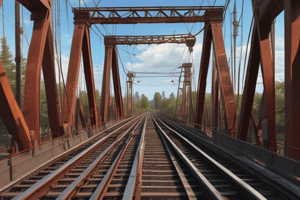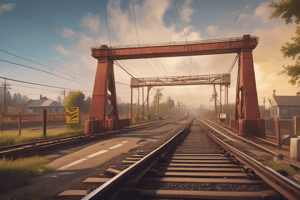Podcast
Questions and Answers
What should you always do when approaching a railroad crossing?
What should you always do when approaching a railroad crossing?
Listen and look both ways for an approaching train, and for signals indicating an approaching train.
How far away should you stop from a railroad crossing?
How far away should you stop from a railroad crossing?
Within 50 feet, but no less than 15 feet from the nearest rail.
What is the chance of death or serious injury in a collision between a train and a motor vehicle?
What is the chance of death or serious injury in a collision between a train and a motor vehicle?
40 times greater than for other highway accidents.
What is the stopping distance for a train that is pulling 150 cars and traveling 50 mph?
What is the stopping distance for a train that is pulling 150 cars and traveling 50 mph?
What safety tips should you follow when approaching railroad crossings? (Select all that apply)
What safety tips should you follow when approaching railroad crossings? (Select all that apply)
Flashcards
Railroad crossing approach?
Railroad crossing approach?
Listen and look both ways for an approaching train and signals.
Railroad stop distance?
Railroad stop distance?
Within 50 feet, but no less than 15 feet from the nearest rail.
Train vs vehicle collision?
Train vs vehicle collision?
40 times greater than for other highway accidents.
Train stopping distance?
Train stopping distance?
Signup and view all the flashcards
Railroad safety?
Railroad safety?
Signup and view all the flashcards
Study Notes
Railroad Crossing Safety
- Always listen and look for trains when approaching railroad crossings; do not proceed until it is confirmed safe.
- Stop within 50 feet but no less than 15 feet from the nearest rail when required.
- The risk of death or serious injury from a train-vehicle collision is 40 times higher than other highway accidents.
Train Stopping Distance
- A freight train consisting of 150 cars traveling at 50 mph requires a stopping distance of 7,000 feet, approximately 1 and 1/3 miles.
Safety Tips for Railroad Crossings
- Expect trains at any time and take caution even on less-frequented tracks.
- Ensure there is enough space on the other side of the tracks before crossing.
- Do not drive around gates or ignore warning signals if a train is not visible.
- Avoid shifting gears while crossing, as it may stall the vehicle on the tracks.
- Never race a train to a crossing; always give way.
- Be vigilant for potential additional trains coming on adjacent tracks.
- Some vehicles, including buses and trucks, are legally required to stop at all crossings.
- Look both ways when approaching a crossing, even if warning flashers are not activated; they may not be functioning correctly.
Studying That Suits You
Use AI to generate personalized quizzes and flashcards to suit your learning preferences.




